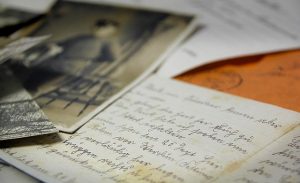In the middle of a worldwide pandemic, great blessings have come to my family. My emotions have been all over the place, but I will try to pull myself together long enough to get some thoughts down. My purpose today is to emphasize how important it is for each one of us to write our own personal story.
Background
 My father served in the South Pacific during World War II. Many servicemen returned home and didn’t talk about their experiences. It was painful. There was no psychological support in those days. They were told to go home and put it behind them, and that’s what many of them tried to do. Dad never talked much about the war. There was an occasional snippet, but mostly just stories of the personalities of the men he served with and got to know. We didn’t really know where he had served, or anything about his experiences other than that he was at the Battle of Buffalo Wallow.
My father served in the South Pacific during World War II. Many servicemen returned home and didn’t talk about their experiences. It was painful. There was no psychological support in those days. They were told to go home and put it behind them, and that’s what many of them tried to do. Dad never talked much about the war. There was an occasional snippet, but mostly just stories of the personalities of the men he served with and got to know. We didn’t really know where he had served, or anything about his experiences other than that he was at the Battle of Buffalo Wallow.
Long after three of us had left home, my younger sister was tasked with writing about a battle for her high school ROTC class. She asked Dad about the Battle of Buffalo Wallow. Dad was ill, and I think he knew he wouldn’t be around much longer. He opened up to her about his experiences. He pulled out pictures from a secret compartment in his closet that our mother didn’t even know he had. Unfortunately, that was the only time Dad ever talked, and we never got the whole story. We had no idea of the significance of what he had done.
Writing the Story
Years later, my sister wrote about what Dad had told her for our family history. I thought the story needed to be told publicly, so I asked her permission to publish it on my little blog. A man by the name of James R. Odrowski read the story and commented on it. His father had served with our father.
Mr. Odrowski spent years researching The Battle of Buffalo Wallow, which resulted in a book. Early in November 2020, just in time for Veteran’s Day, he sent us copies of the book. He also shared a link to actual news footage of the Japanese paratroopers involved in the battle, and he had a two-hour meeting with us via the miracle of technology to share pictures and information.
Life-Changing Information From the Story
What we learned was overwhelming! The Battle of Buffalo Wallow was also called the Battle of the Air Fields—and it was part of the Battle of Leyte. We had no idea what Dad had gone through. Dad and Mr. Odrowski’s father were with the 44th General Hospital. They were supposed to be several miles from the front line, but ended up right in the thick of the fighting. Medical units were not trained for combat, nor were they issued weapons. They were to “do no harm” and were supposed to be protected from attack under the Geneva Convention. Japan never signed the Geneva Convention documents, and attacked clearly marked hospital ships and other medical units.
The 44th General Hospital had a moral dilemma. They could procure weapons to protect themselves and their patients, or adhere to the Geneva Convention with the high likelihood that they would all die. They requested weapons but were denied. By some miracle, the supply staff managed to acquire three ambulances full of guns. It is unknown where they got them, or the circumstances surrounding that event. To make a very long story short, the 44th General Hospital was still standing when the fighting was over, and not one of them lost their lives.
Having Dad’s story not only helps me to understand him better, but it is something my grandchildren will be able to read about on their hard days to gain hope, insight, and courage to keep going.
In December, I will turn 66 years old. My Dad passed away in 1985. Yet, I am just now learning all this. We are fortunate that Mr. Odrowski’s father did talk about the war, and that his son listened and was willing to do years of research so that this story could be told. Untold thousands of stories have been lost.
My Own Story
We’ve been told that Heavenly Father wants us to be a record-keeping people. Admittedly, my own journals have been sporadic in my lifetime. However, I have written about my life on personal blogs, as well as multiple forums such as LDS Blogs. In spite of the fact that I’m a very private person, my life is pretty much an open book at this point. I hope my grandchildren will be able to read about their grandparents and glean something that can help them get through the tough days in their lives.
A Directive From a Prophet of God
“A word about personal journals and records: We urge every person in the Church to keep a diary or a journal from youth up, all through his life.
Would every family, as they now hold their home evenings, train their children from young childhood to keep a journal of the important activities of their lives, and certainly when they begin to leave home for schooling and missions?” (President Spencer W. Kimball, “The Foundations of Righteousness,” Oct. 1977 General Conference.)
That’s a directive from a prophet of God. You can’t get much clearer than that.
An Explanation Behind the Directive
“Not one of my children has any recollection of my grandparents. If I want my children and grandchildren to know those who still live in my memory, then I must build the bridge between them. I alone am the link to the generations that stand on either side of me. It is my responsibility to knit their hearts together through love and respect, even though they may never have known each other personally. My grandchildren will have no knowledge of their family’s history if I do nothing to preserve it for them. That which I do not in some way record will be lost at my death, and that which I do not pass on to my posterity, they will never have. The work of gathering and sharing eternal family keepsakes is a personal responsibility. It cannot be passed off or given to another.
A life that is not documented is a life that within a generation or two will largely be lost to memory. What a tragedy this can be in the history of a family. Knowledge of our ancestors shapes us and instills within us values that give direction and meaning to our lives” (Elder Dennis B. Neuenschwander, Of the First Quorum of the Seventy, “Bridges and Eternal Keepsakes,” Apr. 1999 General Conference).
My father’s untold story is a perfect example of lost history. We have been extremely blessed by James Odrowski and his father. We now have a piece of the puzzle. We have the hope that we too can get through life’s challenges.
Suggested Method to Begin Writing Your Story
To read more of Tudie’s articles, click here.
“Tonight, and tomorrow night, you might pray and ponder, asking the questions: Did God send a message that was just for me? Did I see His hand in my life or the lives of my children? I will do that. And then I will find a way to preserve that memory for the day that I, and those that I love, will need to remember how much God loves us and how much we need Him” (President Henry B. Eyring, “O Remember, Remember,” Oct. 2007 General Conference).
Whatever method you use to get started, please write your story! Your children and grandchildren will someday want to know how you ever survived a global pandemic. They will want to know how you survived other challenges in your life. They will learn from your life. They will learn how to get up and keep moving when life knocks them down. If you don’t write your story, it is an opportunity lost forever.
About Tudie Rose
Tudie Rose is a mother of four and grandmother of ten in Sacramento, California. You can find her on Twitter as @TudieRose. She blogs as Tudie Rose at http://potrackrose.wordpress.com. She has written articles for Familius. You will find a Tudie Rose essay in Lessons from My Parents, Michele Robbins, Familius 2013, at http://www.familius.com/lessons-from-my-parents.
Twitter •







